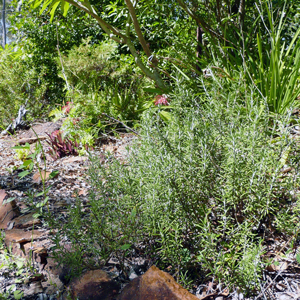Whether using a hint of rosemary, or a good big hit, this ‘hard’ herb will give a lift to just about any food, sweet or savoury. A rosemary bush needs very little love; it will last for years once established; and, if you have limited space, its culinary versatility makes it a herb-of-choice to grow in a pot. Because of its toughness, the forgiving rosemary bush also makes a good filler plant in dry-country shrubberies where not much else will grow.
Rosemary needs at least half a day of full sun, good drainage (sandy soil, a raised bed, or a pot that is seldom watered), and a little light pruning (for the kitchen) to keep it looking ship-shape. In the right spot, the bush will live on and on and on.
This ten-year old rosemary (and lemongrass) is growing inside a fenced vegetable garden. If lettuce-loving wildlife are a problem in your garden as they are in mine, a few bushes of rosemary planted around the veggie patch provide a natural deterrent. Wallabies, kangaroos and hares don’t seem to like rosemary. And the more rosemary you have, the more you can use, not only in the kitchen.
In the kitchen, chopped rosemary is delicious added to tomato and cucumber salad; in marinades for chicken, fish and lamb; added to meat stews; sprinkled over vegetable bakes before they go in the oven; and as a flavour enhancer in soup. Better for you than salt.
A GREAT WAY TO USE ROSEMARY
Two-thirds fill a small (150 ml) screw-top jar with any white vinegar from the pantry. Add 1 tablespoon rosemary leaves, a good grind of black pepper, 1 teaspoon seeded mustard and 1 teaspoon grated lemon or lime peel. If you like, also add crushed clove of garlic and half small red chilli, roughly chopped. Top up the jar with olive or other vegetable oil. Best made at least 24 hours ahead and will keep for several weeks in the fridge (olive oil will solidify and go white in the fridge, but returns to normal at room temperature).
USES: Shake well and use as a dressing for salad; in a dipping bowl with crusty bread; over hot potato, baked carrot, or warm crushed chickpeas. Also excellent to marinate lamb chops, chicken or fish for the barbecue, with no need for extra oil when cooking.
On our next ‘walk around the garden’, we’ll look at growing and using old-fashioned garden mint.
Written and compiled by two frogs.




No comments:
Post a Comment